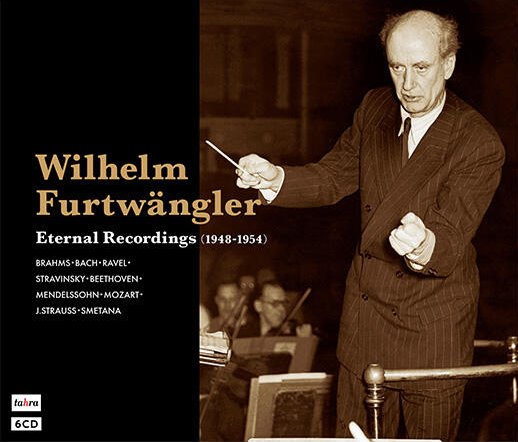King International continues to bundle and reissue selected post-war Furtwängler recordings from Tahra

Renowned Japanese record marketing giant King International acquired the complete rights of Tahra company several years ago. They will continue to reissue and release the now out-of-print Tahra recordings in Japan on 20th November this year. The project is titled “Wilhelm Furtwängler - Eternal Recordings (1948-1954)”, catalog number KKC-4291/6. It features a selection of recordings from eight Tahra post-war Furtwängler live performances, totaling 6 CDs. Similar to previous Tahra reissues, King International carefully remastered the recordings using the original master tapes from Tahra’s collection in their recording studio. This article will provide detailed information about the content included in this release for the reference of fans and enthusiasts.
Content
CD 1
- Brahms: Symphony No. 4 in E minor, op. 98 (Berliner Philharmoniker, broadcasted concert in Titania-Palast on 22 October 1948)
- Bach, J. S.: Suite No. 3 in D major, BWV 106 (Berliner Philharmoniker, season concert in Titania-Palast on 24 October 1948)
CD 2
- Brahms: Variations on a Theme by Joseph Haydn, op. 56a (Berliner Philharmoniker, concert in Opéra de Paris on 4 May 1954)
- Brahms: Symphony No. 1 in C minor, op. 68 (Berliner Philharmoniker, concert in Titania-Palast on 19 February 1952)
CD 3
- Ravel: Valses nobles et sentimentales (Berliner Philharmoniker, rehearsal excerpts and complete studio recording in NWDR broadcasting house on 15 April 1953)
- Stravinsky: Le baiser de la fée Suite (Berliner Philharmoniker, concert in Titania-Palast on 18 May 1953)
CD 4
- Beethoven: Symphony No. 3 in E flat major, op. 55 (Wiener Philharmoniker, studio recording in Musikvereinssaal on 10, 11, 12 and 17 November 1947, along with a re-recording of the opening part of the second movement on 15 February 1949)
CD 5
- Mendelssohn: Die Hebriden, op. 26 (Wiener Philharmoniker, studio recording on 15 February 1949)
- Mozart: Eine kleine Nachtmusik, K. 525 (Wiener Philharmoniker, studio recording on 1 April 1949)
- Strauss, Johann II: Kaiser-Walzer, op. 437 (Wiener Philharmoniker, studio recording on 24 January 1950)
- Beethoven: Symphony No. 4 in B flat major, op. 60 (Wiener Philharmoniker, studio recording on 25 and 30 January 1950)
CD 6
- Smetana: Vltava from Má vlast (Wiener Philharmoniker, studio recording on 24 January 1951)
- Beethoven: Symphony No. 7 in A major, op. 92 (Wiener Philharmoniker, studio recording on 18 and 19 January 1950, along with rehearsal recording with Lucerne Festival Orchestra on 15 August 1951)
Judging from its diverse content the release is mostly repetition, but the selected recordings are sourced from well-preserved and valuable late post-war live performances or studio recordings found on Tahra’s original master tapes or vinyl proto-discs. They have been remixed and remastered. Despite the relatively high prices of many Tahra releases, this reissue is priced at less than 6000 yen (including tax, upon completion of this article). It is worth purchasing for fans who have not collected the complete Tahra Furtwängler recordings. Among them, performances such as the 1952 Brahms Symphony No. 1 and the Wiener Philharmoniker’s Beethoven Symphony No. 3 are known for their high audio quality and acclaim in Furtwängler’s discography.
Compared to the relatively rough quality of the original Tahra releases, which relied on the inherent quality of the source material, this reissue has addressed various pitch errors, speed irregularities, and sound balance issues. For example, the distortion in the original 1954 live recording of Haydn Variations in Paris and the abnormal pitch in Ravel’s Valse have been completely corrected. Based on a comparison with some of King International’s remastered discs and the original Tahra releases, the former still retains some background noise, but the sound is noticeably cleaner, more transparent, and the low frequencies are more solid. The high-frequency distortion that often occurred in Tahra’s original releases has been significantly improved or even eliminated.
It is recommended to pre-order from major Japanese online websites or Taobao sellers. The society does not provide surrogate purchasing services.